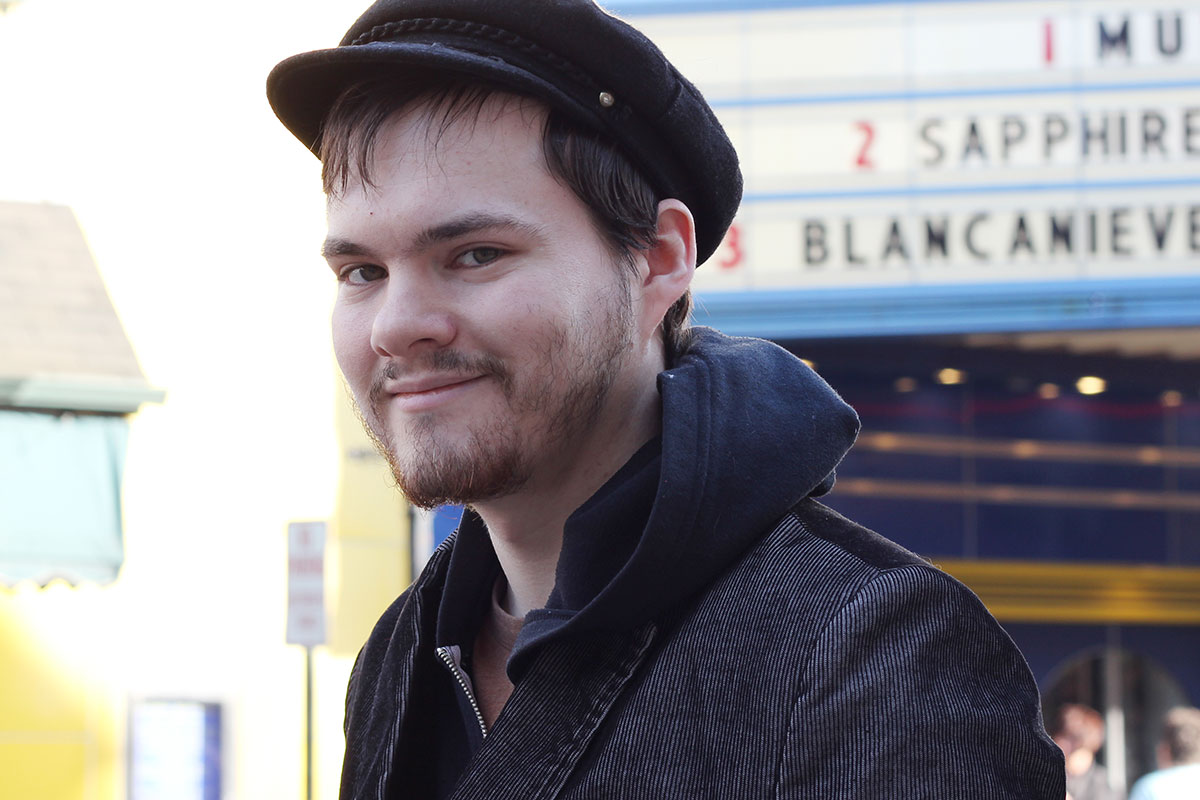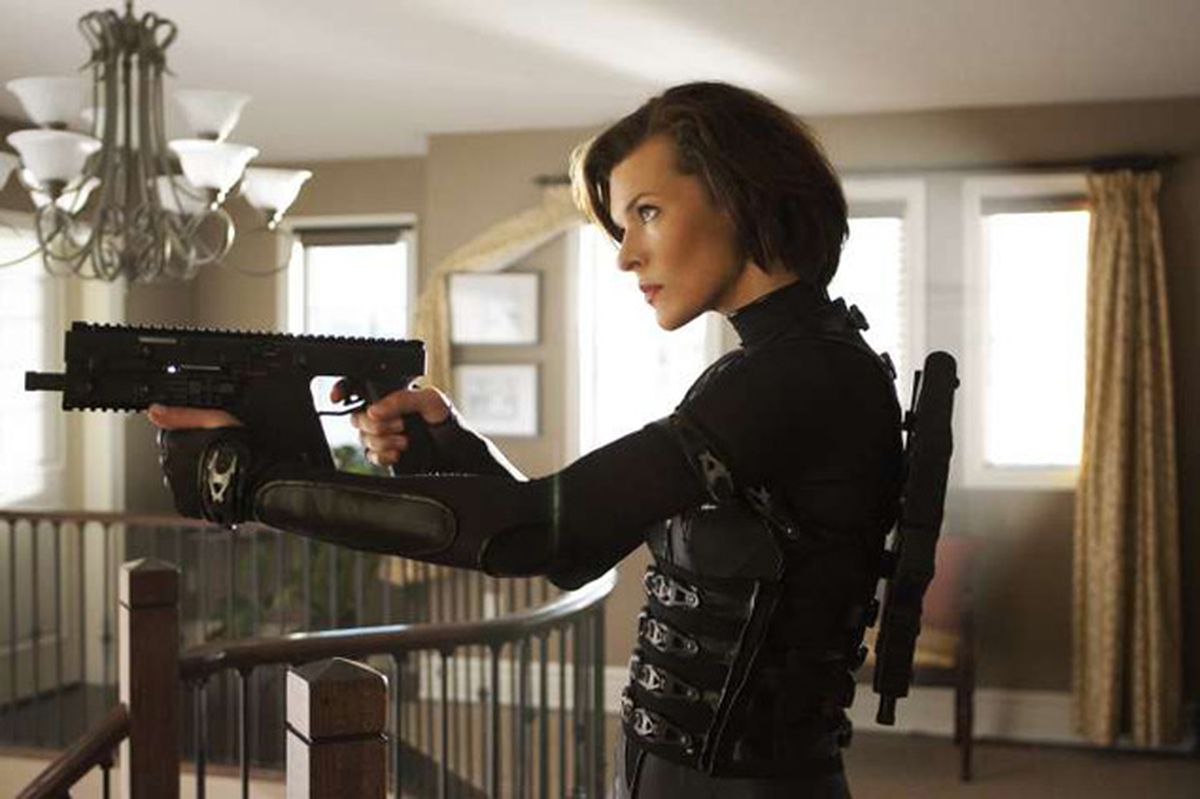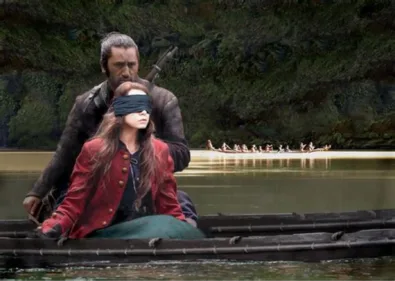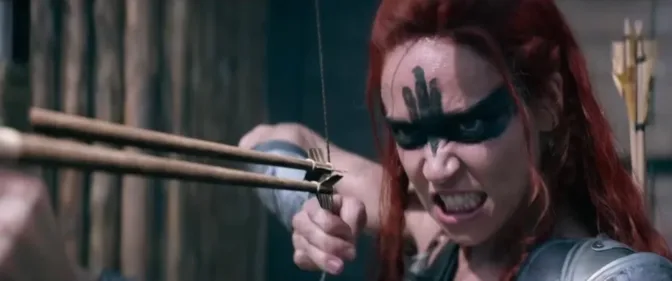I resisted the “Resident Evil” movies for years. Too many years. I loved the first one when I was a teenager; it had beautiful women fighting zombies and a 12-year-old is easy to please like that. But during the heyday of the “Resident Evil” discourse I was on the sidelines, certain these movies couldn’t be as smart or interesting as people made them out to be. I was quite wrong. The people who for years had been positing these films as queer masterworks, and fascinating studies of motion and dissections of gender norms through bodies, attitudes, and clothes, were 100% right.
When I watched these movies I couldn’t wait to make a video essay about them. But I was also aware, as a neophyte, that I’d likely miss some of the nuances and why these movies are so important to people. So I asked my friend, the incredible film critic Willow Maclay, if she would talk to me about why the “Resident Evil” movies are so important. See the full interview below the video essay.
SCOUT TAFOYA: I wanna start by asking what your initial exposure to these movies was? Was there an “A-ha!” Moment with them, or did you kind of evolve with them as they kept getting released?
WILLOW MACLAY: There wasn’t an A-ha! moment as much as “Resident Evil” and its aesthetic has always felt like it was hanging in the air for myself. I grew up playing a lot of survival horror video games, a lot of whom took their influence from the likes of “Assault on Precinct 13” and “Dawn of the Dead,” so the language of “Resident Evil” was always present. I was familiar with the video game series before the first film was released in 2002, but absolutely nobody appreciated it at the time, including myself, so I let go of those movies pretty quickly. It wasn’t until the fourth film “Afterlife” where I stood up and took notice of what Anderson and Jovovich were doing with this character named Alice. She was a blank slate looking for definition, whose continual death and rebirth, allowed her to exist in many shapes and forms. There was always some central thesis of who she was as a woman and as a person present in the character, but it was always evolving until the inevitable disruption caused by the undead. In 2010 I was really gathering a foothold of what I liked and appreciated in movies and so much of that was also tied into my gender identity as a trans woman, which I would verbalize one year after “Resident Evil: Afterlife” was released. Alice lingered with me after I would come out.
This is something I’ve been curious about because as critics we have to find meaning in chaos (and there’s no more chaotic form than the early ’10s blockbuster): when watching the movie Alice’s body and identity seemed so obviously about creating yourself from signifiers. She knows how to handle a gun before she’s comfortable with being a mother, that kind of thing about the push-pull of womanhood and what it can be. Is there something about Anderson’s direction of these movies that underlines this? I guess do you feel like that’s all a natural product of the movies being these body-based science fiction/horror stories or do you think Anderson and Jovovich knew exactly what they were saying?
There’s really something to analyze with these pairings of husband and wife as director and star that I believe allows for a fuller understanding of the body and how it is defined. I’m thinking about the way Sherri Moon Zombie is such a catalyst for the tone in “Lords of Salem” or going further back to the Gena Rowlands pictures that John Cassavetes directed. Anderson is always centering Jovovich with his direction. Her body and how it moves in action is always prioritized, and beginning with “Afterlife,” the slow-motion really becomes a dominant force of form. You mention in your video essay how “The Matrix” seems to be an influence on “Resident Evil”’s language and I agree completely. When you look at those movies the science fiction plotting and lore does over-take the self-definition of Neo (Keanu Reeves) in the sequels, but the initial statement of those films is one of personhood and identification of the self, which is paramount with Jovovich in “Resident Evil.” I think some of the queerness in that thematic reading is incidental from secondhand lifting of “The Matrix,” but what isn’t incidental is the push and pull of Alice’s womanhood. Jovovich is as much an auteur as Anderson in the “Resident Evil” series. How she moves and how she sees the world as this character who is split in half by binaries of violence and maternity keeps expanding with each film until Alice becomes this almost Messianic figure in “The Final Chapter.”
Retribution posits a sort of femininity simulator as the kind of test of the body’s fitness for the wider world, which to me is one of the most fascinating things I’ve seen in a big action movie. It’s extremely moving and thought provoking. What do you make of Jovovich and Rodriguez being put through these kind of diametrically opposed Versions of personhood presenter there? Are they as obviously a test as I read them or is it sort of a closet of identity that everyone then gets to rummage around in and pick the things they want to build themselves? Do you rewatch these movies for fun or comfort?
Yes, I do revisit these movies often, especially the fifth one. Y’know, a lot of people who are huge gamers don’t actually like these movies at all, because they aren’t faithful to the video games, but I always found the respawn and redraw aspect of having a new life that is present in Anderson’s Resident Evil series to be the most profound intermingling of gaming and cinema to date. The reincarnation aspect of learning, adapting and evolving is so prevalent to Alice and why I think she works as a flashpoint character for younger millennial and Gen Z trans women, because in some ways we do the exact same thing when we transition. The queer reading of “Resident Evil” lives and dies by that philosophy.
I think this is especially true in “Retribution,” because it makes that huge artistic leap, and takes a chance with this elongated scene of domesticity, which could be read as a personal fantasy. These scenes are so sweet and mannered and different and allow for Alice to try something different to see if it fits. the eventual sisterhood and camaraderie of survival between Jovovich and Michelle Rodriguez is also significant. Rodriguez is a new version of a character who died in the first film, but here she is living and breathing. Still the same, but different. Those scenes can be read as a test of identity and vitality, because in the larger scheme of things the villains in this movie are looking for an evolved species to survive the plague that they started in that very same pursuit of eternal life, and they look to motherhood. As a plot device, it’s total hokum, but as this larger idea of womanhood as an evolved state and created rather than given, as seen through Jovovich and Rodriguez, it becomes denser and more philosophically interesting.
Completely agree. It hooked me right into it to see her driving a Prius and talking about gun control it breaks the action movie spell in a really compelling and disarming way. These are characters but they’re people, it makes you sort of see the movie as a kind of living thing. That same movie has a scene where Alice sees copies of herself on a conveyor belt, like she’s aware of herself as a creation but it just makes her sort of hold onto her simulation daughter. In essence, she wants to be a mother to this child and so for the length of this film, that child is real. Very few films speak so loudly through implication. What else might a casual viewer miss about Alice’s gender and sexuality if they are just watching them as movies where people with guns fight monsters?
I think viewers sometimes miss a lot with disreputable genres, and the video game adaptation is a newer one, but the attitudes that are cast about the capabilities of genre are not. Video game adaptations admittedly have a far lower ratio of greatness, but we’ve seen these “Resident Evil” movies, Christopher Gans’ “Silent Hill” (which traverses similar thematic ground), and Takashi Miike’s “Ace Attorney” all prove that the video game adaptation is a viable genre.
But I think the final three “Resident Evil” films are probably the best. We were talking not too long about womb spaces in cinema when I brought up Mamoru Oshii’s anime classic “Angel’s Egg” as a film about a life giving creature who is drawn in these hollow worlds she traverses. I’ve always considered Alice to have a similar projection of ideas in her character, and the motherhood angle in “Retribution” ties all of that together. Alice is not a human woman in the grand scheme of things, but a creation. She is something different, and she bears the weight of this layered immortality of constant reincarnation and re-definition that I think is human when we create families and stories. When she becomes a mother she approaches something more divine, and by “The Final Chapter,” she’s living in this completely dead world. The editing by long-time Neveldine/Taylor collaborator Doobie White, robs the film of the balletic grace of “Retribution,” and instead renders Alice in fragments of movement. The disruption of her body through the edit is to further destabilize the character on her journey, but she still moves forward in pursuit of a way to give life back to a deadened Earth. Alice is then this messiah of womanhood, and if one were only watching Resident Evil for guns and monsters they’d miss out on this rather beautiful portrait of humanity as this evolving, changing, learning thing worth saving.
To watch the rest of Scout Tafoya’s Unloved video essays, click here.












